新编英语教程6_答案_李观仪
- 格式:pdf
- 大小:133.00 KB
- 文档页数:18

新编英语教程6练习与答案高级英语(二)教与学指南Practice TestsforAdvanced English(2)主编张华鸿第五、六册本书的主要特点:1.2.前言编写本书的目的:目前英语专业三年级所使用的由上海外国语大学李观仪教授主编的〈新编英语教程〉紧扣精读课文编写练习,实用性、针对性强。
对于同义词辨析的练习配以详尽的解释和相应的例句,旨在帮助学生真正弄懂并掌握这些词的用法。
3.设计了旨在提高学生语言运用熟练程度的系列练习,分别为:一、英语释义二、英语句型转换三、汉译英四、完形填空五、成段改错4.练习均配有参考答案。
本书由张华鸿主编。
高华老师负责编写同义词辨析部分;郑艳丽老师负责编写句型转换部分;张华鸿老师负责编写英语释义、汉译英、完形填空和成段改错四部分,以及全书的编排、设计、整合与审编定稿等工作。
本书承华南师范大学外国语言文化学院领导的大力支持,以及英语系高年级教研室全体同仁的热心帮助,编者在此表示衷心的感谢。
编者2021年1月于华南师范大学外文学院ContentsUnit One: *****S ERUPTSUnit Two: THE FINE ART OF ***** THINGS OFFUnit Three: WALLS AND *****SUnit Four: THE LADY,OR THE TIGER?Unit Five: THE LADY,OR THE TIGER?Unit Six: DULL WORKUnit Seven: BEAUTYUnit Eight: *****EUnit Nine: A RED LIGHT FOR *****WSUnit Ten: *****T-A *****ACYUnit Eleven: ON *****ING *****IPTS TOFLOPPY DISCS AND *****S TO *****NUnit Twelve: GRANT AND LEEUnit Thirteen: *****SMUnit Fourteen: THAT *****ING *****---NATUREUnit Fifteen: *****G AS **********3 16 28 40 53 65 74 84 98 114 131 147 163 175 191TEXT I Unit One*****S ERUPTSI. Paraphrase the parts underlined in the following:So the letter which you asked me to write on my uncle s death has made you eager tohear about the terrors and also the hazards I had to face 12I took a bath, dined, and then dozed 3had been earth 4Campania: but that night the shocks were so violent that everything fell as if it were notonly shaken but overturned.I don t know whether I should call this courage or 5on my part (I was onlyseventeen at the time) but I 6 and went on reading as if I hadnothing else to do.Up came a friend of my uncle s who had just come from Spain to join him. When hesaw us sitting there and me actually reading, he scolded us both ―me for my 7and my mother for allowing it.By now it was dawn [25 August in the year 79], but the light was still dim and 8The buildings round us were already 9and the open space we were in was toosmall for us not to be in real and 10danger if the house collapsed. This finally 11to leave the town. We were followed by a panic- stricken mob of peoplewanting to act on someone else s decision 12looks like 13who 14in a densecrowd.We also saw the sea sucked away and apparently forced back by the earthquake: at anyrate it receded from the shore so that 1516sand. On the landward side a fearful black cloud was 17of flame, and parted to reveal great tongues of fire, like flashes of lightning magnified insize.At this point my uncle s friend from Spain 18still more urgently: “If yourbrother, if your uncle is still alive, he will want you both to be saved; if he is dead, he wouldwant you to survive him so why put off your escape?”Soon afterwards the cloud sank down to earth and covered the sea; it had already 19Capri and hidden the promontory of Misenum from sight. Then my mother 20I looked round: a dense black cloud was coming up behind us, spreading over the earthlike a flood. “Let us leave the road while we can still see,” I said, “or we shall be knockeddown and 21in the dark by the crowd behind.”You could hear the shrieks of women, the 22some were calling their parents, others their children or their wives, trying to recognize them by their voices. People 23were some who 2425gods, but still more imagined there were no gods left, and that the universe was plungedinto eternal darkness forevermore. There were people, too, who 26inventing 27part was on fire, and though their tales were false they found others to believe them. A 28than daylight.I could boast that not a groan or cry of fear 2930dying with me and I with it.We returned to Misenum where we 31and then spent an anxious night alternating between hope and fear.II. Rewrite the followingFor each of the sentences below, write a new sentence as close in meaning as possible to1. We were followed by a panic-stricken mob of people wanting to act on someone else sdecision in preference to their own, who hurried us on our wayby pressing hard behindin a dense crowd.2. We replied that we would not think of considering our own safety as long as we wereuncertain of his.3. There were people, too, who added to the real perils by inventing fictitious dangers: somereported that part of Misenum had collapsed or another part was on fire, and though theirtales were false they found others to believe them.4. I could boast that not a groan or cry of fear escaped me in these perils, had I not derivedsome poor consolation in my mortal lot from the belief that the whole world was dyingwith me and I with it.5. Several hysterical individuals made their own and other people s calamities seemludicrous in comparison with their frightful predictions.Compared with several individuals frightful predictions, the calamities____________III. Translate the following into English1. 还未等我们坐下来喘息,夜幕已经降临,这黑暗使你觉得不是在无月色或多云的夜晚,而像是在灯火熄灭的紧闭的房间里。
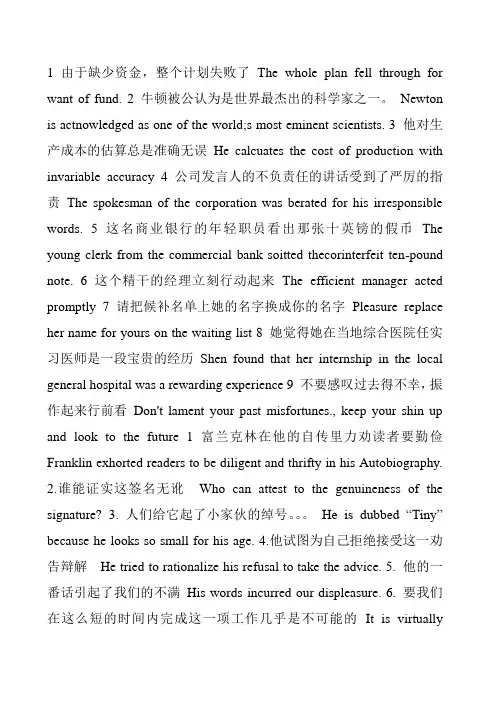
1 由于缺少资金,整个计划失败了The whole plan fell through for want of fund.2 牛顿被公认为是世界最杰出的科学家之一。
Newton is actnowledged as one of the world;s most eminent scientists.3 他对生产成本的估算总是准确无误He calcuates the cost of production with invariable accuracy4 公司发言人的不负责任的讲话受到了严厉的指责The spokesman of the corporation was berated for his irresponsible words.5 这名商业银行的年轻职员看出那张十英镑的假币The young clerk from the commercial bank soitted thecorinterfeit ten-pound note.6 这个精干的经理立刻行动起来The efficient manager acted promptly7 请把候补名单上她的名字换成你的名字Pleasure replace her name for yours on the waiting list8 她觉得她在当地综合医院任实习医师是一段宝贵的经历Shen found that her internship in the local general hospital was a rewarding experience9 不要感叹过去得不幸,振作起来行前看Don't lament your past misfortunes., keep your shin up and look to the future 1 富兰克林在他的自传里力劝读者要勤俭Franklin exhorted readers to be diligent and thrifty in his Autobiography.2.谁能证实这签名无讹Who can attest to the genuineness of the signature?3. 人们给它起了小家伙的绰号。
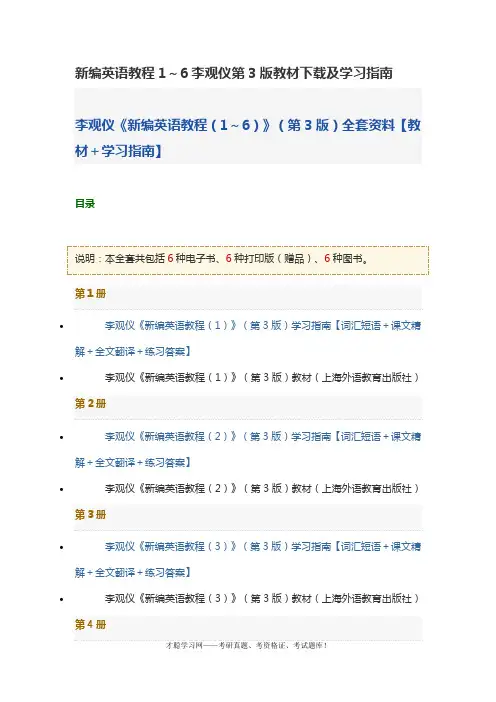
新编英语教程1~6李观仪第3版教材下载及学习指南李观仪《新编英语教程(1~6)》(第3版)全套资料【教材+学习指南】目录•李观仪《新编英语教程(1)》(第3版)学习指南【词汇短语+课文精解+全文翻译+练习答案】•李观仪《新编英语教程(1)》(第3版)教材(上海外语教育出版社)•李观仪《新编英语教程(2)》(第3版)学习指南【词汇短语+课文精解+全文翻译+练习答案】•李观仪《新编英语教程(2)》(第3版)教材(上海外语教育出版社)•李观仪《新编英语教程(3)》(第3版)学习指南【词汇短语+课文精解+全文翻译+练习答案】•李观仪《新编英语教程(3)》(第3版)教材(上海外语教育出版社)•李观仪《新编英语教程(4)》(第3版)学习指南【词汇短语+课文精解+全文翻译+练习答案】•李观仪《新编英语教程(4)》(第3版)教材(上海外语教育出版社)•李观仪《新编英语教程(5)》(第3版)学习指南【词汇短语+课文精解+全文翻译+练习答案】•李观仪《新编英语教程(5)》(第3版)教材(上海外语教育出版社)第6册•李观仪《新编英语教程(6)》(第3版)学习指南【词汇短语+课文精解+全文翻译+练习答案】•李观仪《新编英语教程(6)》(第3版)教材(上海外语教育出版社)•试看部分内容Unit 1一、单元语法本单元主要涉及一般现在时、现在完成时、一般过去时和一般将来时的被动语态。
被动语态表示主语是动作的承受者,由“助动词be+过去分词”构成,表达“被、受、由”之意。
一般用于以下几种情况:(1)不知道谁是动作的执行者I t i s f o u n d t h a t T o m w a s m u r d e r e d.有人发现汤姆被谋杀了。
(2)没有必要指出谁是动作的执行者Fresh fruit is so ld in this marke t.这个市场出售新鲜水果。
(3)强调动作的承受者“A Tale of Two Citie s”was written b y Dicken s.《双城记》的作者是狄更斯。



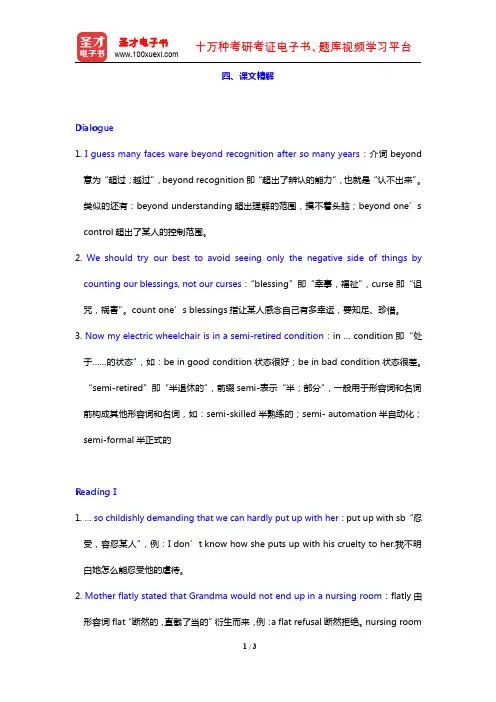
四、课文精解Dialogue1.I guess many faces ware beyond recognition after so many years:介词beyond 意为“超过;越过”,beyond recognition即“超出了辨认的能力”,也就是“认不出来”。
类似的还有:beyond understanding超出理解的范围,摸不着头脑;beyond one’s control超出了某人的控制范围。
2.We should try our best to avoid seeing only the negative side of things by counting our blessings,not our curses:“blessing”即“幸事,福祉”,curse即“诅咒,祸害”。
count one’s blessings指让某人感念自己有多幸运,要知足、珍惜。
3.Now my electric wheelchair is in a semi-retired condition:in…condition即“处于……的状态”,如:be in good condition状态很好;be in bad condition状态很差。
“semi-retired”即“半退休的”,前缀semi-表示“半;部分”,一般用于形容词和名词前构成其他形容词和名词,如:semi-skilled半熟练的;semi-automation半自动化;semi-formal半正式的Reading I1.…so childishly demanding that we can hardly put up with her:put up with sb“忍受,容忍某人”,例:I don’t know how she puts up with his cruelty to her.我不明白她怎么能忍受他的虐待。
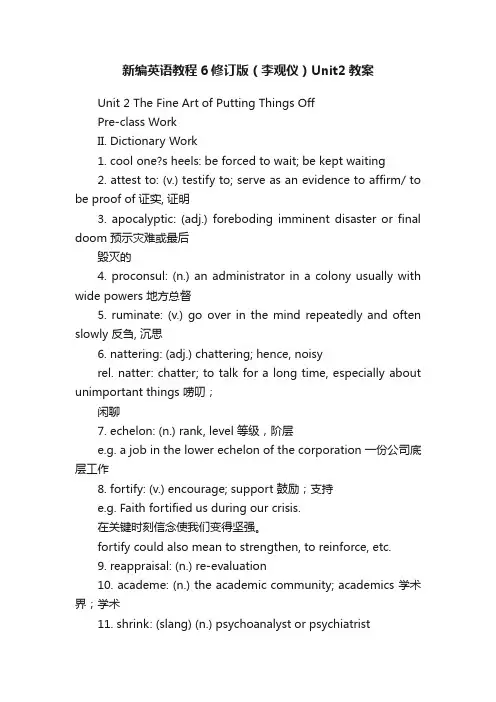
新编英语教程6修订版(李观仪)Unit2教案Unit 2 The Fine Art of Putting Things OffPre-class WorkII. Dictionary Work1. cool one?s heels: be forced to wait; be kept waiting2. attest to: (v.) testify to; serve as an evidence to affirm/ to be proof of 证实, 证明3. apocalyptic: (adj.) foreboding imminent disaster or final doom 预示灾难或最后毁灭的4. proconsul: (n.) an administrator in a colony usually with wide powers 地方总督5. ruminate: (v.) go over in the mind repeatedly and often slowly 反刍, 沉思6. nattering: (adj.) chattering; hence, noisyrel. natter: chatter; to talk for a long time, especially about unimportant things 唠叨;闲聊7. echelon: (n.) rank, level 等级,阶层e.g. a job in the lower echelon of the corporation 一份公司底层工作8. fortify: (v.) encourage; support 鼓励;支持e.g. Faith fortified us during our crisis.在关键时刻信念使我们变得坚强。
fortify could also mean to strengthen, to reinforce, etc.9. reappraisal: (n.) re-evaluation10. academe: (n.) the academic community; academics 学术界;学术11. shrink: (slang) (n.) psychoanalyst or psychiatrist心理分析学者或神经科医生12. subliminal: (adj.) existing or functioning outside the area of consciousawareness 潜意识的13. truism: (n.) an undoubted or self-evident truth 不言而喻的道理;自明之理14. mellow and marinate: (v.) to mellow is to become ripe or fully developed, and the marinate is to steep (浸, 泡) (meat, fish) in a savory sauce to enrich its flavor; here, ripen and mature 成熟及完善III. Library Work1. ChesterfieldPhilip Dormer Stanhope, 4th Earl (伯爵) of Chesterfield , (1694-1773), English statesman, orator and author. His literary reputation rests upon his letters to his illegitimate son (私生子), Philip Stanhope, who was born in Holland in 1732. The letters, filled with wit and worldly wisdom, were published under the title Letters to His Son and Letters to His Godson (1774). Chesterfield's fame as a man of letters rests upon a series of letters, published after his death, that give a faithful account of the manners and customs of aristocratic society in 18th-century England, written in a graceful and witty style.‘M y object is to have you fit to life; which, if you are not, I do not desire that you should live at all.? So wrote Lord Chesterfield in one of the most celebrated and controversial correspondences between a father and his son. Chesterfield wrotealmost daily to his natural son, Philip, from 1737 onwards, providing him with instruction in etiquette and the worldly arts. Praised in their day as a complete manual of education, and despised by Samuel Johnson for teaching …the morals of a whore and the manners of a dancing master?, these letters reflect the political craft of a leading statesman, and the urbane wit of a man who associated with Pope, Addison, and Swift. The letters reveal C hesterfield?s political cynicism and his belief that his country had …always been governed by the only two or three people, out of two or three millions, totally incapable of governing?, as well as his views on good breeding. Not originally intended for publication, this entertaining correspondence illuminates fascinating aspects of eighteenth-century life and manners.2. Samuel Johnson (1709-1784), English writer and lexicographer, a major figure in 18th-century literature as an arbiter of taste, renowned for the force and balance of his prose style.Nicknamed both Dictionary Johnson and the Great Cham of Literature (Cham is an archaic word meaning Khan可汗), Johnson compiled and wrotethe Dictionary of the English Language, published in 1755. He was usually referred to as Dr. Johnson by his contemporaries and later generations.He was equally celebrated for his brilliant and witty conversation. His rather gross appearance and manners were viewed tolerantly, if not with a certain admiration.The son of a bookseller, Johnson excelled at school in spite of illness and poverty. He entered Oxford in 1728 but was forced to leave after a year for lack of funds. He sustained himself as a bookseller and schoolmaster for the next six years, during which he continued his wide reading and published some translations. Johnson settled in London in 1737 and began his literary career in earnest. His poem “London,” published anonymously in1738, was praised by Pope and won Johnson recognition in literary circl es. Johnson?s first work of lasting importance, and the one that permanently established his reputation in his own time, washis Dictionary of the English Language (1755), the first comprehensive lexicographical work on English ever undertaken. Dr. Johnson, as he is universally known, was England?s first full-dress man of letters (学者), and his mind and personality helped to create the traditions that have guided English taste and criticism.StructureSection I (paragraph 1)The theme: Procrastination is not always a non-recommendable practice.Section II (paragraph 2-8)Grounds of argument:Delayers and do-it-nowers (paragraph 2)Delay can inspire and revive a creative soul in many fields (paragraph 3-8)3) in the process of making fictions4) in the field of military, diplomacy and law5) in the higher rank of business6) in decision making7) in universities8) among many people , especially womenSection III (paragraph 9)Conclusion: What you don?t necessarily have to do today, by all means put off till tomorrow.课文译文第二单元推迟的艺术"今天能做的事情决不要推到明天。

Unit 6一、词汇短语Text I1. schizophrenia[ ]n. a serious mental illness in whichsomeone’s thoughts and feelings are not based on what is reallyhappening around them [内科] 精神分裂症e.g.It also found significantevidence of association with variation on chromosomes 11 and 18 thatcould help account for the thinking and memory deficits of schizophrenia.在11号和18号染色体上,我们发现重大的与变异有关的证据,它能帮助说明精神分裂症思维和记忆缺陷。
2. stigmatize[ ]vt. If someone or something is stigmatized, theyare unfairly regarded by many people as being bad or having somethingto be ashamed of. 侮辱e.g.:Children in single-parent families must notbe stigmatized.单亲家庭的孩子不应该受到侮辱。
【拓展】adj. stigmatic 有烙印的;丑恶的;不名誉的;n. stigma [植] 柱头;耻辱;污名;烙印;特征stigmatization 描绘;陈述4. inferior[ ] adj. not good, or not as good as someone or somethingelse下级的,下等的n. sb who has a lower position or rank than you in anorganization 下级,地位低的人It was a gentleman’s duty always to becivil, even to his inferiors.一个绅士的责任是一直保持彬彬有礼,即使是对比自己地位低的人。
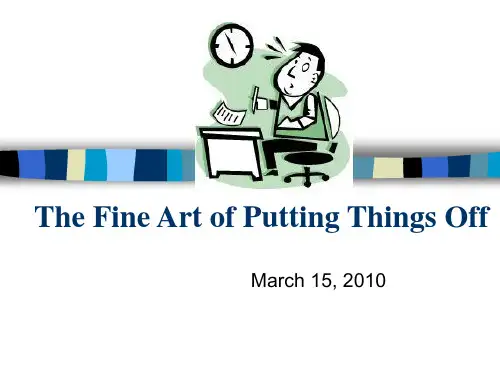
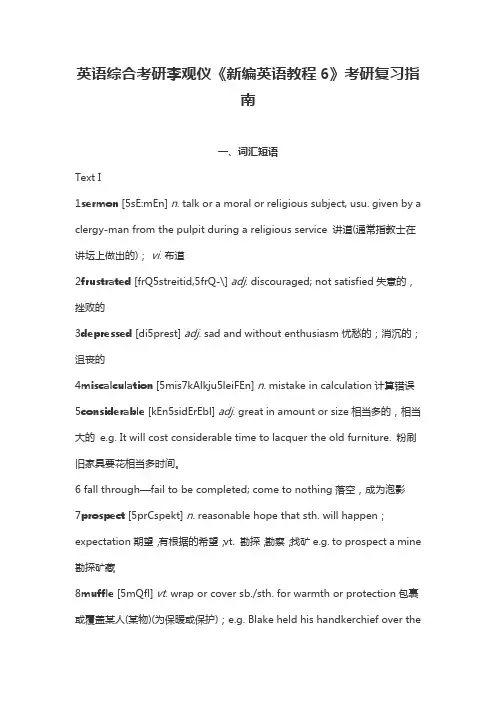
英语综合考研李观仪《新编英语教程6》考研复习指南一、词汇短语Text I1sermon [5sE:mEn] n. talk or a moral or religious subject, usu. given by a clergy-man from the pulpit during a religious service 讲道(通常指教士在讲坛上做出的);vi.布道2frustrated [frQ5streitid,5frQ-\] adj. discouraged; not satisfied失意的,挫败的3depressed [di5prest] adj. sad and without enthusiasm忧愁的;消沉的;沮丧的4miscalculation [5mis7kAlkju5leiFEn] n. mistake in calculation计算错误5considerable [kEn5sidErEbl] adj. great in amount or size相当多的,相当大的e.g. It will cost considerable time to lacquer the old furniture. 粉刷旧家具要花相当多时间。
6 fall through—fail to be completed; come to nothing落空,成为泡影7prospect [5prCspekt] n. reasonable hope that sth. will happen;expectation期望,有根据的希望;vt. 勘探;勘察;找矿e.g. to prospect a mine 勘探矿藏8muffle [5mQfl] vt. wrap or cover sb./sth. for warmth or protection包裹或覆盖某人(某物)(为保暖或保护);e.g. Blake held his handkerchief over themouthpiece to muffle his voice.布莱克用手帕遮住话筒来压低声音。
练习册:We may regard “if only” as indicating the past and “next time” the future, we all know the most important time is “now”, as past things could not be changed and future is based on “now”.I. 1. The old man was an eminent psychiatrist and the author was a client of his. (famous and respected within a particular profession)2. Refer to para. 1. To him, the session was just like “a flash of insight that leaves him a changed person—not only changed, but changed for the better.”3. The three speakers on the tape were all unhappy, and the two words they all used frequently in what they said were “if only.” What the old man wanted to point out to the author was that to keep saying “if only” would not change anything; on the contrary, it only kept the person facing the wring way—backward instead of forward. Thus it did more harm than good to the person who kept saying them. (See para. 15)4. Shift the focus; substitute “next time” for “if only”5. They point to entirely different mental directions; one is backward and negative, and the other forward and positive.6. It is instructive and inspirational.II. 1. The most inspiring and gratifying fact of life is the unexpected spark of enlightenment that makes you different and a better person than before.2. At last he walked over from the other side of the street, wrapped in his old-fashioned overcoat, his bald head covered by a shapeless felt hat. He looked like a dwarfish old man full of energy rather than a well-known psychiatrist.3. The next speaker on the tape was a woman who had remained single because she thought she was obliged to take care of her mother who was a widow. She still remembered and told others miserably about all the chances of marriage she had missed.4. Eventually, if you form a habit of sayi ng “if only”, the phrase can really turn to an obstruction, providing you with an excuse for giving up trying anything at all.5. …you are always thinking of the past, regretting and lamenting. You did not look forward to what you can do in the future at all.6. The Old Man said to me trickily, using the phrase “if only” on purpose, “If only we’d got here ten seconds earlier, we’d have caught the cab.” I laughed and understood what he meant. So I followed his advice and said, “Next time I’ll run faster”.III. 1. The whole plan fell through for want of fund.2. Newton is acknowledged as one of the world’s most eminent scientists.3. He calculates the cost of production with invariable accuracy.4. The spokesman of the corporation was berated for his irresponsible words.5. The young clerk from the commercial bankLANGUAGE WORKI. 1. C 2. C 3. D 4. B 5. C 6. A 7. D 8. A 9. D 10. B 11. A 12. B 13. C 14. D15. A 16. B 17. B 18. A 19. A 20. DIII. 1. predominantly, prevailing 2. preferential 3. tremulous 4. inadvisable, shrinkage 5. sensitive, terrorism/terror6. magnifying7. unapproachable, fictitious8. unbecoming/becoming9. unaccountable 10. disorientation 11. persuasion, entreaties 12. irremediableIV. 1. blame 2. reproached 3. blamed/reproached 4. reproached5. rebuke/reprimand6. reprimanded7. rebuke/scold/reprimand8. reprimanded9. reprimanded 10. scolded 11. reproach 12. scoldedV. 1. on 2. In 3. over 4. in 5. from 6. beneath 7. with 8. in 9. of 10. Since 11. to 12. in 13. with 14. with 15. between 16. with 17. to 18. In 19. on 20. In 21. to 22. on 23. in 24. likeVI. 1. ash 2. outbreaks 3. interval 4. eruption 5. volcanologist 6. which 7. lava 8. cone 9. flood 10. under 11. crater 12. began 13. cauliflower 14. like 15. andUnit TwoTEXT ITHE FINE ART OF PUTTING THINGS OFF未修订前的练习答案:I. Paraphrase the parts underlined in the following:“Never put off till tomorrow,” 1exhorted Lord Chesterfield in 1749, “what you can do today.”’ That the elegant earl never 2got around to marrying his so n’s mother and had a bad habit of keeping 3worthies like Dr. Johnson cooling their heels for hours in an anteroom 4attests to the fact that even the most well-intentioned men have been postponers ever. Quintus Fabius Maximus, one of the great Roman generals, was 5dubbed “Cunctator” (Delayer) for putting off battle 6until the last possible vinum break. Moses 7pleaded a speech defect to rationalize his reluctance to deliver Jehovah’s edict to Pharaoh. Hamlet, of course, raised procrastination to an art form.There are those who prepare their income taxes in February, prepay mortgages and serve precisely planned dinners at an 8ungodly 6: 30 p.m. The other half dine happily on leftovers at 9 or 10, misplace bills and 9file for an extension of the income tax deadline. They seldom pay credit-card bills until the 10apocalyptic voice of Diners threatens doom from Denver. They postpone, 11as Faustian encounters) visits to barbershop, dentist or doctor.Yet 12for all the trouble procrastination may incur, delay can often inspire and revive a creative soul.From Cunctator’ s day until this century, the art of postponement had been 13virtually a monopoly of the military (“Hurry up and wait”), diplomacy and the law. In former times, a British proconsul faced with a native uprising could comfortably 14ruminate about the situation with Singapore Sling” in hand. 15Blessedly, he had no flattering Telex to order in machine guns and fresh troops.Even 16where there is no will, there is a way. There is a difference, of course, between chronic procrastination and purposeful postponement, particularly 17in the higher echelons of business.The data explosion 18fortifies those seeking excuses for inaction —another report to be read, another authority to be consulted.His point is well 19taken. 20Bureaucratization, which flourished amid the growing burdens of government and the greater complexity of society, was designed to smother policymakers in blankets of legalism, compromise andreappraisal --- and thereby prevent hasty decisions from being made.Many languages are 21studded with phrases that refer to putting things off ---from the Spanish maiana to the Arabic bukrafil mishmish.There are all sorts of 22rationalizations: the pressure of teaching responsibilities at home, checking out the latest book, looking up another footnote.”To Georgia State Psychologist Joen Fagan, however; procrastination may be a kind of 23subliminal way of sorting the important from the trivial.It is something of 24a truism that to put off making a decision is itself a decision. The parliamentary process is essentially a system of delay and deliberation. So, 25for that matter, is the creation of a great painting, or 26an entree, or a book, or a building like Blenheim Palace, which took the Duke of Marlboro ugh’s architects and laborers 15 years to construct. In the process, the design can 27mellow and marinate.In other words, 28pace Lord Chesterfield, what you don’t necessarily have to do today, by all means put off until tomorrow.I. Paraphrase1. exhorted: urged strongly2. the elegant earl never got around to marrying his son's mother: found time for3. a habit of keeping worthies like Dr. Johnson cooling their heels for hours: men of importance like Dr. Johnson waiting4. That.…attests to the fact that: proves5. one of the great Roman generals was dubbed "Cunctator": named humorously6. for putting off battle until the last possible vinum break: until an effective defense deserving a celebration with champagne was ensureda speech defect, and that he had reasons for8. at an ungodly 6:30 p.m.: unreasonable9. to file for an extension of the income tax deadline: apply officially10.until the apocalyptic voice of Diners threatens doom from Denver: warning, suggests unavoidable destruction11.They postpone, as Faustian encounters, visits to barbershop: as if they will see devils13.the art of postponement had been virtually a monopoly of the military, diplomacy and the law: found almost only in the field of14.to ruminate about the situation with Singapore Sling in hand: go over in mind repeatedly and slowly15.Blessedly, he had no nattering Telex to order machine guns and fresh troops: fortunately, noisy16.Even there is no will, there is a way: there is no will to delay, there is a way to do so.17.in the higher echelons of business: in the case of higher levels18.The data explosion fortifies those seeking excuses for inaction: encourages, doing nothing19.His point is will taken: accepteddeveloped very quickly as a result of the expanding administrative structure and the greater complexity of society, were made to restrict policymakers, who have to be engaged in endless paperwork, mediation and reconsideration21.Many languages are studded with phrases that refer to putting things off: filled22.There are all sorts of rationalizations: reasons23.a kind of subliminal way of sorting the important from the trivial: way outside one's conscious awareness24.It is something of a truism: an undoubted truth25.for that matter: as further concerns the thing mentioned26.So…is the creation of an entree: a small carefully prepared meat dish27.the design can mellow and marinate: ripen and mature28.pace Lord Chesterfield: with all due respect toII. Rewrite the followingFor each of the sentences below, write a new sentence as close in meaning as possible to the original sentence by using the given words as the beginning.1. That the elegant earl never got around to marrying his son’s mother and had a bad habit of keeping worthies like Dr. Johnson cooling their heels for hours in an anteroom attests to the fact that even the most well-intentioned men have been postponers ever.The fact that even the most well-intentioned men have been postponers ever can be testified ___ by the elegant earl who never got around to marrying his son’s mother and had a bad habit of keeping worthies like Dr. Johnson cooling their heels for hours in an anteroom.2. Moses pleaded a speech defect to rationalize his reluctance to deliver Jehovah’s edict to Pharaoh.By saying that he had a speech defect, Moses rationalized his reluctance to deliver Jehovah’s edict to Pharaoh.3. Yet for all the trouble procrastination may incur, delay can often inspire and revive a creative soul.Although procrastination may incur, delay can, yet, often inspire and revive a creative soul.4. Bureaucratization, which flourished amid the growing burdens of government and the greater complexity of society, was designed to smother the policy-makers in blankets of legalism, compromise and reappraisal.The design of bureaucratization, which flourished amid the growing burdens of government and the greater complexity of society, was to smoother the policy-makers in blankets of legalism, compromise and reappraisal.5. There is a long and honorable history of procrastination to suggest that many ideas and decisions may well improve if postponed.Procrastination has been honored long, suggesting that many ideas and decisions may well improve if postponed.III. Translate the following into English1.事实上,拖延这种现象的漫长而骄人的历史本身就已经表明,许多构想和决定如果加以推迟可能会更为圆满。
Unit 6 The Diary of the Unknown SoldierKey to exercises:V ocabulary exercises:I. Explain the underlined parts in your own words.1. only2. makes me feel painful3. Further casualties have been caused4. It is said that …5. appearing full of, radiatingII. F ill in the blank in each sentence with a word or phrase taken from the box in its appropriate form.1. running2. tucked3. inspected4. taken precautions5. with an air of6. adventurous7. enraged8. panickedIII. Fill in the blanks with the appropriate forms of the given words.1. stiffened2. errors3. invasion4. assumption5. innocence6. assignment7. explosion8. descriptionIV. C hoose a word or phrase that can replace the underlined part in each sentence without changing its original meaning.1. B2. D3. C4.D5. C6. B7. C8. AV. Give a synonym or an antonym of the word underlined in each sentence in the sense it is used.1. Synonym: heaps, stacks2. Antonym: love, kindness3. Synonym: small, lesser4. Antonym: surplus, abundance, plenty5. Synonym: reasonable, rational6. Synonym: terrible, desperate7. Synonym: bold, brave8. Synonym: regular, usualVI. Write in each space the meaning of each given word.1. balance2. defeat3. catch up and pass4. emphasize5. support6. bear7. lessen8. preventGrammar exercises:I. Complete the following dialogue with appropriate question words.1. How big2. Who3. What4. How often5. Why6. WhatⅡ. Supply the right questions the inspector asks.1. What did you do on Friday2. What time did you get up3. Did you have breakfast4. Who’s Mary5. Where did you meet her6. What does she do7. Where does she live8. What’s she like9. Do you often see her10. Why did she come to you on Friday morningⅢ. Complete the telephone conversation to find out the following information.1.she has gone2.when she will be back3.if she went out aloneⅣ. Explain the differences between the two sentences in each pair.1. a. It signals that rain is expected by the speaker.b. It suggests that the speaker does not expect it to rain.2. a. It is more emphaticb. It is more formal. The speaker is probably losing patience with the listener.3. a. It is used to express doubt or uncertainty.b. It is used to seek confirmation from the listener and the speaker expectsagreement.4. a. The speaker expects the listener has carried out the action.b. The speaker may be displeased or annoyed that the action was performed.5. a is more polite that b.6. a is quite friendly while b conveys a bit irritation.7. a. With a rising tone, the tag question is used to verify or check information thatwe think is true or to check information that we aren’t sure is true.8. a. The non-polarized tag question is used for special effect, such as sarcasm,disbelief, shock, anger, concern, etc.b. The polarized tag question is used to verify or check information.Ⅴ. Put the following sentences into reported speech.In his editorial, the editor of the local newspaper reported that they had recently sent out their youngest reporter around their local hospitals. He had found that while in some cases the facilities provided for out-patients were extremely good, and waiting rooms were bright and cheerful places, in others, patients were still expected to sit in dreary passages, moving form chair to chair as the queue diminished, no literature was provided, and the canteen, if one existed at all, might be five minutes’walk away. They felt that far more could be done to obviate such inconvenience, and that some hospitals were not taking full advantage of the various voluntary bodies which offered excellent assistance in the provision of canteens and suchlike.VI. Make sentences of your own after the sentence given below, keeping the parts in italics in your sentences.1. e.g. I must endure the hardships for the present, if not for myself, then for myparents.I must go on studying hard abroad, if not for myself, then for my country.2. e.g. It appeared to be only a matter of time before they were caught.You’ll learn how to do it eventually—it’s only a matter of time. Translation exercises:I. Translate the following sentences into Chinese.1. 我所到之处满目疮痍,楼房夷为瓦砾,活人成了死尸,生命的欢乐已然封存在一具具尸体之内,这一切时时刻刻都在刺痛着我的心。
新编英语教程6李观仪第3版学习指南及练习题库答案李观仪《新编英语教程(6)》(第3版)学习指南【词汇短语+课文精解+全文翻译+练习答案】内容简介《新编英语教程(第3版)学习指南》按照原教材的课次进行编写,每单元涉及单元语法、词汇短语、参考译文、课文精解以及练习答案等内容,旨在帮助学生更好、更高效地学习和掌握教材中的重点及难点知识,具有很强的针对性和实用性。
在编写过程中,该书力求突出重点,答疑难点,语言言简意赅,讲解深入浅出,希望它能得到广大英语专业学生和英语自学者的喜爱和认可。
•试看部分内容Unit 1一、词汇短语T ex t I1.s e r mo n[5s E:m E n]n.ta l k o r a mo r a l o r r e l i g i o u s s u b j e c t,u s u.g i v en b y a c l e r gy-man f r o m t h e p u lp i t d u r in g a r e l i g iou s s er vic e 讲道(通常指教士在讲坛上做出的);v i.布道2.f r u st r a te d[f r Q5str e i ti d,5f r Q-\]a d j.dis c ou r a ged; n o t s a tis fi ed 失意的,挫败的3.d e p r e s s e d[d i5p r e s t]a d j.s a d a n d w i t h o u t e n t h u s i a s m忧愁的;消沉的;沮丧的4.m i s c a l c u l a t i o n[5m i s7k A l k j u5l e i F E n]n.m i s t a k e i n c a l c u l a t i o n 计算错误5.c o n s i d e r a b l e[k E n5s i d E r E b l]a d j.g r e a t i n a m o u n t o r s i z e相当多的,相当大的 e.g.I t w i l l c o s t c o n s i d er ab l e t i m e t o l a c q u er th e old fu rn i tu re. 粉刷旧家具要花相当多时间。
练习册:We may regard “if only” as indicating the past and “next time” the future, we all know the most important time is “now”, as past things could not be changed and future is based on “now”.I. 1. The old man was an eminent psychiatrist and the author was a client of his. (famous and respected within aparticular profession)2. Refer to para. 1. To him, the session was just like “a flash of insight that leaves him a changed personnot onlychanged, but changed for the better.”3. The three speakers on the tape were all unhappy, and the two words they all used frequently in what they said were“if only.” What the old man wanted to point out to the author was that to keep saying “if only anything; on the contrary, it only kept the person facing the wring way—backward instead of forward. Thus it didmore harm than good to the person who kept saying them. (See para. 15)4. Shift the focus; substitute “next time” for “if only”5. They point to entirely different mental directions; one is backward and negative, and the other forward andpositive.6. It is instructive and inspirational.II. 1. The most inspiring and gratifying fact of life is the unexpected spark of enlightenment that makes you differentand a better person than before.2. At last he walked over from the other side of the street, wrapped in his old-fashioned overcoat, his bald headcovered by a shapeless felt hat. He looked like a dwarfish old man full of energy rather than a well-knownpsychiatrist.3. The next speaker on the tape was a woman who had remained single because she thought she was obliged to takecare of her mother who was a widow. She still remembered and told others miserably about all the chances ofmarriage she had missed.4. Eventually, if you form a habit of say ing “if only”, the phrase can really turn to an obstruction, providing you withan excuse for giving up trying anything at all.5. …you are always thinking of the past, regretting and lamenting. You did not look forward to what you can do inthe future at all.6. The Old Man said to me trickily, using the phrase “if only” on purpose, “If only we?d got here ten we?d have caught the cab.” I laughed and understood what he meant. So I followed his advice and said,I?ll run faster”.III. 1. The whole plan fell through for want of fund.2. Newton is acknowledged as one of the world?s most eminent scientists.3. He calculates the cost of production with invariable accuracy.4. The spokesman of the corporation was berated for his irresponsible words.5. The young clerk from the commercial bankLANGUAGE WORKI. 1. C2. C3. D4. B5. C6. A7. D8. A9. D 10. B 11. A 12. B 13. C 14. D 15. A 16. B 17. B 18. A 19. A 20. DIII. 1. predominantly, prevailing2. preferential3. tremulous4. inadvisable, shrinkage5. sensitive, terrorism/terror6. magnifying7. unapproachable, fictitious 8. unbecoming/becoming 9. unaccountable 10.disorientation 11. persuasion, entreaties 12. irremediable IV. 1. blame 2. reproached 3. blamed/reproached 4. reproached5. rebuke/reprimand6. reprimanded7. rebuke/scold/reprimand8. reprimanded9. reprimanded 10. scolded 11. reproach12. scolded V. 1. on2. In3. over4. in5. from6. beneath7. with8. in9. of 10. Since 11. to12. in 13. with 14. with 15. between 16. with 17. to 18. In 19. on20. In 21. to 22. on 23. in 24. like VI. 1. ash2. outbreaks3. interval4. eruption5. volcanologist6. which7. lava8. cone9. flood 10. under 11. crater 12. began13. cauliflower 14. like 15. andUnit Two TEXT ITHE FINE ART OF PUTTING THINGS OFF未修订前的练习答案:I. Paraphrase the parts underlined in the following:“Never put off till tomorrow,” 1exhorted Lord Chesterfield in 1749, “what you can do today.”? That the elega never 2got around to marrying his son?s mother and had a bad habit of keeping 3worthies like Dr. Johnson cooling their heels for hours in an anteroom 4attests to the fact that even the most well-intentioned men have been postponers ever.Quintus Fabius Maximus, one of the great Roman generals, was5dubbed “Cunctator ” (Delayer) for putting off battle 6until the last possible vinum break. Moses 7pleaded a speech defect to rationalize his reluctance to deliver Jehovah?s edict to Pharaoh. Hamlet, of course, raised procrastination to an art form.There are those who prepare their income taxes in February, prepay mortgages and serve precisely planned dinners at an 8ungodly 6: 30 p.m. The other half dine happily on leftovers at 9 or 10, misplace bills and9file for an extension of the income tax deadline. They seldom pay credit-cardbills until the 10apocalyptic voice of Diners threatens doom from Denver. They postpone, 11as Faustian encounters) visits to barbershop, dentist or doctor. Yet 12for all the trouble procrastination may incur, delay can often inspire and revive a creative soul.From Cunctator ’ s day until this century, the art of postponement had been 13virtually a monopoly of the military (“Hurry up and wait”), diplomacy and the law. In former times, a British proconsul faced with a native uprising could comfortably14ruminate about the situation with Singapore Sling ” in hand. 15Blessedly, he had no flattering Telex to order in machine guns and fresh troops. Even 16where there is no will, there is a way. There is a difference, of course, between chronic procrastination and purposeful postponement, particularly17in the higher echelons of business. The data explosion18fortifies those seeking excuses for inaction —another report to be read, another authority to beconsulted.His point is well 19taken. 20Bureaucratization, which flourished amid the growing burdens of government and the greater complexity of society, was designed to smother policymakers in blankets of legalism, compromise and reappraisal --- and thereby prevent hasty decisions from being made.Many languages are 21studded with phrases that refer to putting things off ---from the Spanish maiana to the Arabic bukrafil mishmish.There are all sorts of 22rationalizations: the pressure of teaching responsibilities at home, checking out the latest book, looking up another footnote.”To Georgia State Psychologist Joen Fagan, however; procrastination may be a kind of 23subliminal way of sorting the important from the trivial.It is something of 24a truism that to put off making a decision is itself a decision. The parliamentary process is essentially a system of delay and deliberation. So, 25for that matter, is the creation of a great painting, or 26an entree, or a book, or a building like Blenheim Palace, which took the Duke of Marlborough?s archite cts and laborers 15 years to construct. In the process, the design can 27mellow and marinate.In other words, 28pace Lord Chesterfield, what you don?t necessarily have to do today, by all means put off until tomorrow.I. Paraphrase1. exhorted: urged strongly2. the elegant earl never got around to marrying his son's mother: found time for3. a habit of keeping worthies like Dr. Johnson cooling their heels for hours: men of importance like Dr. Johnson waitingattests to the fact that: proves4. That.…5. one of the great Roman generals was dubbed "Cunctator": named humorously6. for putting off battle until the last possible vinum break: until an effective defense deserving a celebration with champagne was ensured7. Moses pleaded a speech defect to rationalize his reluctance to deliver Jehovah's edict to Pharaoh: claimed that he hada speech defect, and that he had reasons for8. at an ungodly 6:30 p.m.: unreasonable9. to file for an extension of the income tax deadline: apply officially10.until the apocalyptic voice of Diners threatens doom from Denver: warning, suggests unavoidable destruction11.They postpone, as Faustian encounters, visits to barbershop: as if they will see devils12.Yet for all the trouble procrastination may incur: in spite of13.the art of postponement had been virtually a monopoly of the military, diplomacy and the law: found almost only inthe field of14.to ruminate about the situation with Singapore Sling in hand: go over in mind repeatedly and slowly15.Blessedly, he had no nattering Telex to order machine guns and fresh troops: fortunately, noisy16.Even there is no will, there is a way: there is no will to delay, there is a way to do so.17.in the higher echelons of business: in the case of higher levels18.The data explosion fortifies those seeking excuses for inaction: encourages, doing nothing19.His point is will taken: accepted20.Bureaucratization, which flourished amid the growing burdens of government and the greater complexity of society, was designed to smother policymaker in blanks of legalism, compromise and reappraisal: Excessive silly rules, which developed very quickly as a result of the expanding administrative structure and the greater complexity of society, were made to restrict policymakers, who have to be engaged in endless paperwork, mediation and reconsideration21.Many languages are studded with phrases that refer to putting things off: filled22.There are all sorts of rationalizations: reasons23.a kind of subliminal way of sorting the important from the trivial: way outside one's conscious awareness24.It is something of a truism: an undoubted truth25.for that matter: as further concerns the thing mentioned26.So…is the creation of a n entree: a small carefully prepared meat dish27.the design can mellow and marinate: ripen and mature28.pace Lord Chesterfield: with all due respect toII. Rewrite the followingFor each of the sentences below, write a new sentence as close in meaning as possible to the original sentence by using the given words as the beginning.1. That the elegant earl never got around to marrying his son?s mother and had a bad habit of keeping worthies like Dr. Johnson cooling their heels for hours in an anteroom attests to the fact that even the most well-intentioned men have been postponers ever.The fact that even the most well-intentioned men have been postponers ever can be testified ___ by the elegant earl who never got around to marrying his son?s mother and had a bad habit of keeping worthies like Dr. Johnson cooling their heels for hours in an anteroom.2. Moses pleaded a speech defect to rationalize his reluctance to deliver Jehovah?s edict to Pharaoh.By saying that he had a speech defect, Moses rationalized his reluctance to deliver Jehovah?s edict to Pharaoh.3. Yet for all the trouble procrastination may incur, delay can often inspire and revive a creative soul.Although procrastination may incur, delay can, yet, often inspire and revive a creative soul.4. Bureaucratization, which flourished amid the growing burdens of government and the greater complexity of society, was designed to smother the policy-makers in blankets of legalism, compromise and reappraisal.The design of bureaucratization, which flourished amid the growing burdens of government and the greater complexity of society, was to smoother the policy-makers in blankets of legalism, compromise and reappraisal.5. There is a long and honorable history of procrastination to suggest that many ideas and decisions may well improveif postponed.Procrastination has been honored long, suggesting that many ideas and decisions may well improve if postponed.III. Translate the following into English1.事实上,拖延这种现象的漫长而骄人的历史本身就已经表明,许多构想和决定如果加以推迟可能会更为圆满。